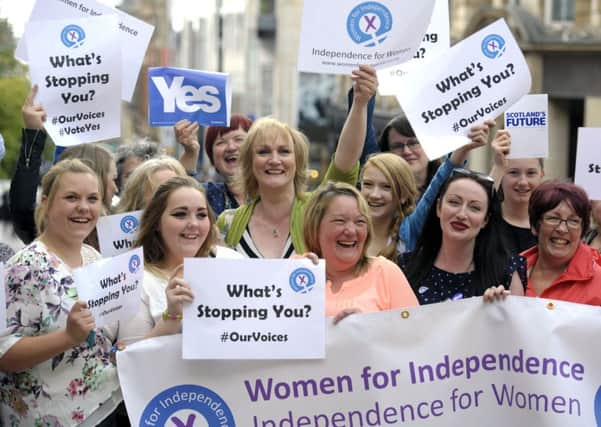Poll: attitudes changing to Scottish independence


The latest Scottish Social Attitudes survey found support for a Yes vote increased from 36% to 39% during the last 12 months, while No support fell from 64% to 61%, excluding undecided voters.
Despite this, 38% now feel an independent Scotland’s influence on the world stage would be weaker, up from a quarter in 2013.
Advertisement
Hide AdAdvertisement
Hide AdFears have also increased over the state of the economy under independence, with 44% believing it would be worse, an increase of 10 points since last year.
Survey analysts said the findings overall appear to show that referendum campaigning “has indeed made a difference to public attitudes”.
John Curtice, co-director of the survey at ScotCen Social Research, said: “Although support for a Yes vote has increased during the last 12 months, more voters have in fact become nervous about the consequences of leaving the UK.
“Support for independence has only increased because those who are convinced it would be beneficial for Scotland are more willing to put their cross in the Yes box.
“However, at present there are still insufficient voters who are of that view to deliver a majority for independence.”
The annual survey also found a significant gender gap in support for independence, with a 12-point difference between men and women - 31% compared with 43% when undecided voters are excluded.
Rachel Ormston, research director at ScotCen, said: “In the final weeks of the campaign, capturing women’s votes remains a key challenge, particularly for the Yes campaign.
Advertisement
Hide AdAdvertisement
Hide Ad“Put off by uncertainty and less likely to be persuaded by patriotic arguments around ‘pride’, women still need to be convinced that independence will deliver on the economy and other areas.
“However, the No campaign should not assume it will automatically benefit from women’s lower level of support for a Yes vote - nearly a third of women remain undecided how they will vote in September.”
A spokesman for Yes Scotland said: “It is encouraging to see support for an independent Scotland reach its highest level since 2005 when the different options are presented in this survey, but of course we have work to do.
“Two other polls in the past week have shown support for Yes as high as 47% - including the snap poll conducted after last week’s debate, which also showed support for independence slightly higher among women, at 48%.
“Over the next five weeks, we will highlight that a Yes vote is Scotland’s one opportunity to protect the NHS from Westminster privatisation, create more jobs in Scotland and transform childcare instead of wasting billions of pounds on Trident nuclear weapons.”
Margaret Curran, shadow Scottish secretary and Labour MP for Glasgow East, said: “The First Minister was more concerned with talking about aliens and pandas during his TV debate with Alistair Darling last week, but this survey shows that the key issue for families in Scotland is the economy.
“That is why the question of currency is so vital. It is about more than just the notes and coins in our pockets. It is about our mortgages and rent, our credit card and shopping bills, our savings and pensions. How can we plan for the future if we don’t have any idea what currency we would be using?
“We don’t have to take that risk. We can keep the pound by saying No Thanks to separation. We can have the best of both worlds for Scotland - a strong Scottish Parliament with more powers guaranteed, backed up by the strength, security and stability of the UK.”
The survey was carried out between May and July this year.